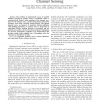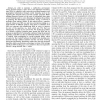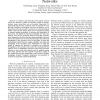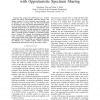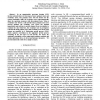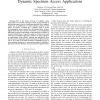147
click to vote
TWC
2008
15 years 2 months ago
2008
Abstract--We investigate the dynamic spectrum sharing problem among primary and secondary users in a cognitive radio network. We consider the scenario where primary users exhibit o...
112
click to vote
TSP
2008
15 years 2 months ago
2008
The problem of opportunistic access of parallel channels occupied by primary users is considered. Under a continuous-time Markov chain modeling of the channel occupancy by the prim...
105
click to vote
CORR
2008
Springer
15 years 2 months ago
2008
Springer
Abstract--We consider power control in cognitive radio networks where secondary users identify and exploit instantaneous and local spectrum opportunities without causing unacceptab...
110
Voted
CORR
2008
Springer
15 years 2 months ago
2008
Springer
We study two distinct, but overlapping, networks which operate at the same time, space and frequency. The first network consists of
126
click to vote
WCNC
2010
IEEE
2010
IEEE
Hedonic Coalition Formation Games for Secondary Base Station Cooperation in Cognitive Radio Networks
15 years 6 months ago
— In order to maintain a conflict-free environment among licensed primary users (PUs) and unlicensed secondary users (SUs) in cognitive radio networks, providing frequency and g...
124
click to vote
ICC
2007
IEEE
15 years 8 months ago
2007
IEEE
— In cognitive radio networks, the secondary network (users) are allowed to utilize the frequency bands of primary network (users) when they are not currently being used. To supp...
112
click to vote
GLOBECOM
2007
IEEE
15 years 8 months ago
2007
IEEE
— We analyze the performance of a wireless system that allows opportunistic spectrum sharing. The system consists of a set of primary users sharing a set of channels over a cover...
103
click to vote
WCNC
2008
IEEE
15 years 8 months ago
2008
IEEE
— In an opportunistic spectrum sharing (OSS) wireless network there are two types of users: primary users and secondary users. The primary users own the license for the system ba...
102
click to vote
ICASSP
2008
IEEE
15 years 8 months ago
2008
IEEE
—We consider power control in spectrum overlay networks (also referred to as opportunistic spectrum access) where secondary users identify and exploit instantaneous and local spe...
117
click to vote
CISS
2008
IEEE
15 years 8 months ago
2008
IEEE
—One of the major concerns of cognitive radios when used for secondary spectrum access is the potential of interfering primary users, considering especially that cognitive radios...

